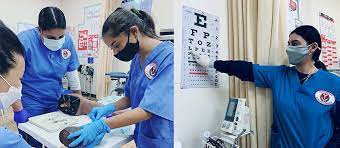An esthetician helps promote healthy skin by giving clients skin-care treatments. If you want to work in a spa or salon and want to be a part of the wellness community, you could like being an esthetician. You can decide if this is the perfect career for you by learning about the common requirements.
This article explains what an esthetician is, how to become one, what the average pay and job outlook are for the field, and what skills these professionals typically employ.
Who is an Esthetician?
An esthetician is a person who is certified and authorized to provide treatment and advice on skincare. They provide the general public with information on everything related to skincare and skin beauty. They put a lot of emphasis on skin health and vitality maintenance, and they frequently design customized skin care regimens for their patients. To achieve ideal skin health and attractiveness, they make professional procedure recommendations and carry them out.
What does an Esthetician do?
An esthetician will assess your skin and provide tips on how to make it seem better. The following are the objectives of an esthetician for your skin:
- To lessen and avoid aging’s symptoms
- To enhance the way your skin looks
- To keep your skin healthy
- To reduce the impact of sun exposure,
Estheticians provide a range of services to assist your skin in achieving these objectives. Spas, salons, private clinics, and physician offices all offer services. Every cosmetic procedure and therapy carried out is surface-level. Note that they are noninvasive and only address the skin’s outermost layers.
Why do people need an Esthetician?
People seek out an esthetician’s expertise for a variety of reasons.
#1. Selfcare.
Estheticians provide various services, such as aromatherapy and scalp massages, which are great ways to treat oneself and decompress. Regular visits to an esthetician can present chances to incorporate serenity and relaxation into your self-care regimen.
#2. Skincare advice.
Estheticians are great people to consult for general skin care guidance. For instance, you might require assistance determining your skin type and direction on the best products to use.
#3. Skincare concerns.
If you have any of the following particular skin concerns, you can also speak with an esthetician:
- Acne
- Dry skin
- Fine lines and wrinkles
- Sensitive skin
- Sun damage
- Unwanted body or facial hair
What are the services of an Esthetician?
You can find a range of skincare and cosmetic services that an esthetician can provide:
- Acne treatments
- Aromatherapy
- Body scrubs (such as sugar scrubs) and other types of exfoliation
- Chemical peels
- Extractions (removing blackheads)
- Facials
- Laser resurfacing
- Laser skin rejuvenation
- Light therapy
- Makeup tutorials and applications
- Masks and full body wraps
- Microdermabrasion
- Moisturizing treatments
- Pore cleansing
- Scalp massage
- Waxing or chemical hair removal
Where do Estheticians work?
There are several locations where one can find estheticians! A few places you might find an esthetician are as follows:
- Spas
- Salons
- Freelancing
- TV/Movie Sets
- Editorial Sets
- Med Spas
- Cruise Ships
- Resorts
How to become an Esthetician
Here are a few steps you can follow to become an esthetician:
#1. Enroll in a cosmetology or esthetician program.
Finish a cosmetology or esthetician program approved by the state in which you wish to work. While some states accept applicants as long as they are at least 16 years old, others require applicants to have a high school degree or GED before allowing them to enroll in cosmetology or esthetician schools. The cost, location, scheduling, and availability of esthetics programs can differ, so it’s a good idea to look into all of the options in your area to choose which one will benefit you the most.
Training in client interactions, cosmetology, and esthetician treatments, and methods for sanitizing tools and workspaces are all provided by cosmetology or esthetician programs. Enrolling in a cosmetology or esthetics program can verify that your abilities are sufficient and provide you with an understanding of the tasks an esthetician does daily. The majority of cosmetology and esthetician schools combine classroom instruction with practical practice in the form of coursework.
#2. Obtain a state license.
Obtain a license to practice esthetics in the state in which you intend to work. To guarantee you earn the necessary license, it’s crucial to research your state’s unique legislation, as each state may have various requirements or methods for gaining licensure. A passing score on the state licensure exam and a predetermined amount of classroom and practical education are requirements set by several states.
Written and practical components, such as administering treatments or demonstrating mastery of methods, are usually included in these tests. Many states mandate that you renew your license after a predetermined number of years. States may differ in this regard, so as soon as you have your license, think about finding out when to renew it to make sure you continue practicing law.
#3. Consider certification.
While certification isn’t necessary for many jobs, it can demonstrate your commitment to the practice and enthusiasm for the industry. Having a certification may set you apart from other applicants when you seek work as an esthetician because not all candidates have pursued one. After graduating from cosmetology or esthetician school and working in the industry for at least two years, estheticians can begin the certification process. Estheticians who meet all the prerequisites can take a test and, if they pass, receive certification.
The National Coalition of Estheticians Association (NCEA) offers the National Esthetician Credential, which is the most widely used credential for estheticians. To become certified, candidates must study from a training handbook and apply in four to six weeks. You get permission to take the test after applying, and you can use a computer at home to do so. You can retake the exam to renew your NCEA certification once it expires, which is good for three years.
#4. Gain experience in the field.
Apply for jobs as an esthetician at entry level. Estheticians might work in independently run spas or salons or for larger companies like resorts, hotels, and hospitals. By practicing what you learn, you can become a more skilled esthetician and become an expert at performing chemical peels, facials, and other treatments. Additionally, it might help you establish a solid clientele that knows you both personally and through your work.
#5. Continue your education.
When you begin working in the field, make an effort to continue completing the courses necessary to become an esthetician, including maintaining a state license. Being informed of when to renew your license might be beneficial because most licenses require renewal after a set number of years. This could entail retaking the test or putting in a certain number of practical hours.
What is the job description for an esthetician?
Estheticians help clients feel better about their appearance by applying carefully chosen creams to ensure the health of their patients’ skin or by offering relaxation services like facial massages to those who want a pampered look.
Most estheticians work in salons and spas, while some are employed by dermatologists.
In the end, you will evaluate the individual needs of patients and collaborate closely with them to enhance the condition of their skin.
Responsibilities
- Offer facials, body treatments, waxing, and cosmetics application services.
- Give cosmetics instructions.
- Follow through on appointments on time by keeping an eye on your schedule.
- Greet customers with warmth and friendliness.
- Accompany patients to and from treatment areas, expressing gratitude to them as they leave.
- Conduct client interviews to learn about any contraindications.
- Examine a client’s skin to determine whether therapy is appropriate.
- Give clients skin care advice.
- Suggest appropriate therapies and at-home care routines.
- Talk with clients about subjects that are relevant to their interests during sessions.
What is the average salary of an Esthetician?
Data from Indeed indicates that estheticians make, on average, $59,797 annually. This number may differ depending on several variables, including the esthetician’s location, experience, firm size, credentials, and any specializations. Additionally, these professionals frequently receive 401(k) matching, tuition reimbursement, and support for their professional growth.
How do I become a licensed Esthetician in NYC?
One must use the New York State e-Licensing system to apply for a license. You must have a NY.gov ID account. If you do not have an account, you should go to the MY NY.gov Online Services page to sign up for an account.
To apply for an esthetics license, you must:
- Be 17 years old and above
- Pass the written and practical exams administered by New York State after completing a 600-hour approved course of study. Your school director must fill out the application’s “Affirmation of New York State Approved Schooling” part as evidence of your satisfactory completion.
- Be examined by a nurse practitioner, doctor, or physician’s assistant. The application’s Health Certification part needs to be filled out and dated by a doctor, physician’s assistant, or nurse practitioner. Once the health certification is signed and dated, you have thirty days to submit your application.
What is the difference between an esthetician and an aesthetician?
An esthetician will handle cosmetic and maintenance procedures, while an aesthetician specializes in medical procedures. Both are highly skilled professionals in the field of skincare.
What makes the most money as an esthetician?
According to ZipRecruiter, these are some typical jobs for estheticians, and the salary ranges are associated with them.
#1. Beauty Therapists
Average salary: $85,000-$155,000 per year
Depending on their place of employment, beauty therapists do a wide variety of duties. One of your primary responsibilities at a spa or beauty salon is giving clients beauty treatments for their hands, feet, and faces. The majority of beauty therapists also counsel their clients on the best at-home remedies for personal skin care. For every client, you also suggest the best beauty items. Other typical responsibilities include hair removal, putting on fake nails or eyelashes, spray tanning, and delivering massages to help people de-stress. While some beauty therapists are generalists, others have a focus.
#2. Licensed Esthetician
Average salary: $38,000-$78,000 per year
Clients receive skincare and other cosmetology procedures from licensed estheticians. In this capacity, you talk about potential skin-related issues with your client and their treatment goals. In addition, you can clear pores, remove hair, and recommend items that could enhance your client’s appearance. While some licensed estheticians work in hospitals and other healthcare facilities, the majority of them are employed in spas and beauty salons. You might also recommend makeup goods, demonstrate to clients how to apply various items to their skin, or assist patients in getting ready for their recuperation following plastic surgery, depending on your workplace and the kinds of clients you handle.
#3. Master Esthetician
Salary range: $46,000-$77,500 per year
A master esthetician offers their clients esthetician services and advice in addition to beauty goods. You provide both men and women with a wide range of basic and advanced medical treatments as a master esthetician who will assist in preserving or enhancing skin health. There are numerous places where you could work as a medical aesthetician, including medical facilities, spas, resorts, and even homes of clients. Among your responsibilities will be giving facial cleanings and other beauty treatments to clients so they can feel confident about their looks and well-being. As opposed to a cosmetologist, who is trained in both skin and nail care, your role is limited to skin care.
What skills do you need to be an esthetician?
- Solid experience in the field of esthetics or a related field
- Capacity to interact with clients in an efficient manner
- Capacity to create a strategy for the treatment of customers
- The capacity to put a client at ease
- Thorough understanding of skin care methods
- A valid Esthetician’s license and a high school diploma or GED equivalent are required.
Which is better, cosmetology or esthetician?
You might be interested in esthetics if you prefer skincare and medically-related beauty services. Similarly, cosmetology may be the best option for you if you’re interested in innovative style services and beautification.
What is the highest level of esthetician?
The most prestigious credential in the aesthetics field, recognized by employers globally, is a CIDESCO (Comité’ International d’Esthétique et de Cosmetologie) diploma or certificate.
What can an esthetician not do?
The treatments that estheticians can provide are restricted to the skin’s outermost layers. As a result, they are unable to perform deep chemical peels or administer any kind of injectable, such as Botox, which cures wrinkles, or facial fillers, which provide a non-surgical facelift.
Ten Top Schools for Estheticians
| COLLEGE/UNIVERSITY | INSTITUTION TYPE | LOCATION | ESTIMATED UNDERGRAD IN-STATE TUITION (2022-2023)* |
| Paul Mitchell Schools | Beauty College | Nationwide Locations | Varies by Location |
| Clary Sage College | Beauty College | Tulsa, OK | $21,200 |
| Central Carolina Community College | Community College | Pittsboro, NC | $2,500 |
| Ogle School | Beauty College | Dallas, TX | $12,000 |
| Avenue Five Institute | Beauty College | Austin, TX | $12,600 |
| Evergreen Beauty College | Beauty College | Bellevue, WA | $12,200 |
| Honolulu Community College | Community College | Honolulu, HI | $3,200 |
| Saddleback College | Community College | Mission Viejo, CA | $1,100 |
| Johnson County College | Community College | Overland, KS | $2,900 |
| Mott Community College | Community College | Flint, MI | $5,200 |
*Source: NCES, U.S. Department of Education
What is Esthetician Insurance?
Esthetician insurance is a policy that offers a variety of small business insurance options designed to handle the risks associated with the occupation.
For instance, the general liability section of your esthetician insurance would pay your legal expenses if a client had a bad reaction to treatment and filed a lawsuit against your company.
Who needs Esthetician Insurance?
The following are some examples of professions that can profit from esthetician insurance:
- Barber shop owners
- Beauticians
- Cosmetologists
- Estheticians
- Hair and nail salon owners
- Hairdressers
- Makeup artists
- Massage therapists
- Nail salons
- Spa owners
What does Esthetician Insurance cover?
Esthetician insurance comes in a variety of forms for small businesses, covering a broad range of issues such as mishaps, legal action, lost revenue, stolen goods, and broken tools.
A business owners policy is a good place to start (BOP). By combining three crucial coverages, a BOP builds a solid basis for coverage and is typically less expensive than purchasing each coverage type independently.
What does Esthetician Insurance not cover?
Policies for estheticians do not always cover unanticipated events. The following are a few typical exclusions:
- Deliberate or fraudulent acts.
- Earthquakes (you’ll need to buy a separate earthquake insurance policy).
- Floods and earthquakes (you’ll need to buy a separate flood insurance policy).
- Government confiscations.
- Infectious diseases.
- Radioactive fallout
- War.
- Wrongful dismissal (unless you have employment practices liability insurance).
What makes a good Esthetician?
An expert in skin care who is eager to educate their clients about the newest procedures and products is what makes an excellent esthetician. In addition to having strong communication skills to respond to inquiries from patients, they must also be educated about the procedures and materials involved in skin care to recommend the best course of action for each patient.
Who does an Esthetician work with?
Dermatologists and other medical professionals collaborate with many Estheticians in medispas, day spas, and other salons.
How To Open A Profitable Cosmetic Skincare Business In Nigeria
How Your Beauty and Skincare Brand Can Increase Brand Awareness
SALON EQUIPMENT: Ultimate Guide






